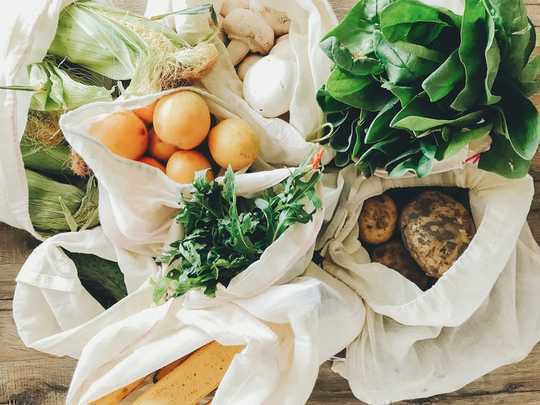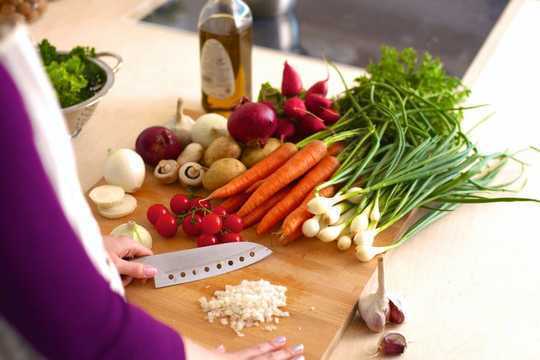 Bogdan Sonjachnyj/Shutterstock
Bogdan Sonjachnyj/Shutterstock
Over the last month there has been a dramatic transformation in our access to and the availability of food – along with where we eat and with who. At the same time, personal, family and societal health has never been more on the nation’s agenda.
The closure of cafes, restaurants, fast food outlets, schools and workplace canteens has contributed to more people eating at home. It seems that lockdown has encouraged many people to rediscover the joys of home cooking – with more people cooking more from scratch and throwing away less food. There has also been a 93% growth in flour sales as many people have gone back to basics and started baking.
Research shows that more frequent cooking in general and cooking from scratch is associated with a healthier diet. So could it be that lockdown may mark the start of a healthier relationship with food for many people?
Changing shopping habits
Before the pandemic, UK dietary data from 2019 showed that average fruit, vegetable and fibre intakes were below recommended levels, while average sugar intakes were above recommendations.
Get The Latest By Email
Recent shopping data shows that people in recent weeks have been buying more frozen food and long-lasting foods such as cans and food with a long shelf life. But although many people associate healthy eating with fresh produce, recent purchasing patterns shouldn’t prevent dietary recommendations from being met – frozen and canned choices still count towards these recommendations, are cheaper than fresh alternatives and last longer.
Tinned fruit on breakfast cereal or porridge, for example; or a tin of chickpeas in a curry; dried fruit in natural yoghurt or canned lentils in a soup – all of these will count towards your the five recommended portions of fruit or veg a day. All fresh, frozen, dried and canned varieties count, with fruit juice also contributing to a maximum of one portion.
 More people are cooking from scratch, using veg boxes and throwing less food away. Monkey Business Images/Shutterstock
More people are cooking from scratch, using veg boxes and throwing less food away. Monkey Business Images/Shutterstock
The recent data on shopping habits also shows a huge increase in alcohol purchases. It might be that some of that growth is down to people stockpiling alcohol. An estimated 50 million pints are going unused in pubs, so it is also likely that many people are replacing drinking out with drinking at home.
The chief medical officer’s guidelines say it’s safest not to regularly drink more than 14 units of alcohol a week, which is equivalent to six pints of beer or six 175ml glasses of wine.
What we should eat
The best way to ensure a wide variety of nutrients, including vitamins and minerals, is to eat a varied, balanced diet. This, alongside other lifestyle choices like avoiding smoking and taking part in daily physical activity, can help lower the risk of a number of chronic health conditions including obesity, type 2 diabetes and heart disease. It also helps to support the healthy functioning of our entire bodies from our bones to our brain.
Very simply, a healthy balanced diet is one that is full of variety and served in the right proportions. A practical tool to help with this is the Eat Well Guide. Explained here, the Eat Well Guide illustrates the proportion of foods from each food group we should aim to eat overall to achieve a healthy, balanced diet.
 The pandemic has changed how many people cook and eat. Micolas/Shutterstock
The pandemic has changed how many people cook and eat. Micolas/Shutterstock
If you are wanting to make healthy changes during this time, evidence from behavioural sciences might also be able to help. Research shows that reducing the range or proportion of less healthy options and positioning them in less accessible positions may contribute to meaningful changes in food behaviours. So at home, this means placing fruit and vegetables in sight and within easy reach and maybe hiding the crisps and chocolate in the garage or in a harder to reach cupboard so they aren’t easily accessible.
More than a meal
The NHS has updated its guidance to suggest that people might want to consider taking 10mg of vitamin D a day as levels from sunlight may not be enough if most of the day is spent indoors.
But other than this, a varied balanced diet will provide the wide range of nutrients you need – both at this time and more broadly just as part of a healthy diet. If there is concern about achieving this, a multivitamin and mineral supplement may be worth considering.
It’s also important, though, not to forget that food isn’t just about nutrients for humans. Food brings joy through its tastes and flavours. Food connects us to those around us, to nature and our own unique cultures and experiences.
Even in isolation, food is driving new connections across communities, with people in lockdown planting seeds on windowsills, local producers delivering directly to new customers, and people coming together to plan joint neighbourhood and extended family shopping missions. Those people essential to our entire food supply chain are also finally getting the societal recognition they deserve.![]()
About The Author
Danielle McCarthy, Senior Lecturer in the School of Biological Sciences, Queen's University Belfast
This article is republished from The Conversation under a Creative Commons license. Read the original article.
books_foods







